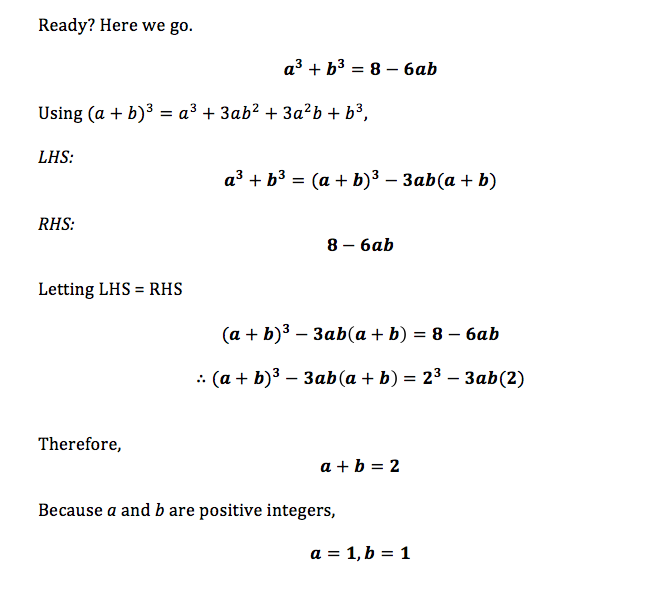A simple one
2 a 3 + b 3 = 4 − 3 a b
If a and b are positive integers that satisfy the equation above, find the value of a − b .
The answer is 0.
This section requires Javascript.
You are seeing this because something didn't load right. We suggest you, (a) try
refreshing the page, (b) enabling javascript if it is disabled on your browser and,
finally, (c)
loading the
non-javascript version of this page
. We're sorry about the hassle.
4 solutions
How about (2,0)
Log in to reply
0 is not a 'positive integer' !
It's given that a , b ∈ Z +
Could you explain how you got from the fourth line to the fifth?
Log in to reply
For reals x , y , z , we have a well-known identity:
x 3 + y 3 + z 3 − 3 x y z = ( x + y + z ) ( x 2 + y 2 + z 2 − x y − y z − z x )
You can easily prove it using Newton's Identities or other factoring methods.
Next, note that,
x 2 + y 2 + z 2 − x y − y z − z x = 2 1 ( 2 x 2 + 2 y 2 + 2 z 2 − 2 x y − 2 y z − 2 z x ) = 2 1 ( ( x 2 − 2 x y + y 2 ) + ( y 2 − 2 y z + z 2 ) + ( z 2 − 2 z x + x 2 ) ) = 2 1 ( ( x − y ) 2 + ( y − z ) 2 + ( z − x ) 2 )
If you combine this result with the identity stated at the very beginning and substitute x = a , y = b , z = ( − 2 ) , you'll get exactly what Thamidu got in his solution.
I am using the definition that 0 is not a whole number ( more... ).
2 a 3 + b 3 = 4 − 3 a b ⇒ a 3 + b 3 = 8 − 6 a b .
Since a , b > 0 ⇒ a 3 + b 3 = 8 − 6 a b < 8 ⇒ a , b < 2 ⇒ a = b = 1 ⇒ a − b = 0
I'm sure it doesn't make much of a difference, but I think you typed 8-6ab wrong.
This is a very easy question . Since it is Given that a and b are positive integers this implies RHS of the equation must be greater than 0 . Thus it implies ab < (4/3) . i.e. a and b must be less than 2 . Thus they both are = 1 . Hence solution . Easiest question i Faced :)

Go through the factorisation below, 2 a 3 + b 3 = 4 − 3 a b a 3 + b 3 = 8 − 6 a b a 3 + b 3 + ( − 2 ) 3 = 3 a b ( − 2 ) a 3 + b 3 + ( − 2 ) 3 − 3 a b ( − 2 ) = 0 ( a + b − 2 ) ⋅ 2 1 [ ( a − b ) 2 + ( b + 2 ) 2 + ( 2 − a ) 2 ] = 0 We get that else a + b − 2 = 0 or ( a − b ) 2 + ( b + 2 ) 2 + ( 2 − a ) 2 = 0
∵ a , b ∈ Z + only solutions we can obtain are,
a + b = 2 ⇒ ( a , b ) = ( 1 , 1 )
( a − b ) 2 + ( b + 2 ) 2 + ( 2 − a ) 2 = 0 ⇒ No solutions for a , b .
It yields that there is only one unique value for the answer.
∴ 0 suites for a − b .